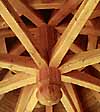
Once we have the timbers sawn, dried and planed, we begin the actual work on the
timber frame. The frame design was determined some time prior in our
Design Studio, where a computer-generated timber list showing each timbers
dimensions and location in the frame was produced. This list, along with a complete
set of frame drawings, is the basis for all subsequent work on a frame .
Layout is the process by which the information from the frame drawings is transferred
onto the faces of each timber so the actual cutting can begin. Before marking anything
on a timber, the layout leader visually grades the piece of timber. All defects
are noted, as well as which faces are visually most pleasing.
After taking into account at least eight variables, he determines the placement
and orientation of a timber in a frame. Then notations are made in pencil on the
timber that describe each joint. Each mortise, tenon and peg hole is marked in pencil
on each timber surface.
A second equally skilled joiner, called the checker, comes along and verifies each
decision that the layout leader has made. If they are in agreement, a dark marker
is used to highlight material that is to be removed by the cutters in the
Timber Shop. If there is any discrepancy, both joiners get together and
iron out the difficulty before the process resumes. Tolerances of 1/32" are what
we typically expect of ourselves and this expectation is taken seriously by everyone.
Since we deal with a massive structure in which each piece is fabricated separately
and never assembled until it reaches the job site, it pays to be precise. When completely
laid out and checked, each timber makes its way to the Timber Shop where the individual
joints are precisely crafted.
After each and every joint on a piece is cut, the timber returns to the Layout Barn.
That information is noted on the layout leader's drawings and timber list as completed
and stored until all timbers in the frame are done.
|
click to enlarge

Layout Barn

Doug working in the layout barn

Boring the peg hole

Guide lines on the beams

Beams

Ready for finishing

Ready for shipping
|
Finishing Stage
Once all timbers are crafted, we move into the finishing process. Typically each
timber is planed with a large handheld electric planer, and then a clear tung oil-based
finish is applied by hand.
In addition to the smooth planed and oiled finish, we have other finish treatments
for different desired looks. For a more rustic look we sometimes skip the initial
timber planing and leave the marks and finish from the sawmill visible. This creates
a more rustic feel to the finished frame. For a weathered surface texture we sandblast
the visible surfaces of the completed timbers. Sandblasting removes some of the
softer spring wood and leaves the harder summer wood intact. This creates a surface
that shows the grain pattern in three dimensions. It is quite pleasing to both the
eye and touch.
Embellishments Even though an unadorned timber frame is quite beautiful in
and of itself, it is sometimes appropriate to add embellishments. These may take
many forms such as subtly curved braces, decorative chamfers on timber edges, carvings
of dates, sayings or images into timber faces and carved acorns or finials on the
ends of timbers. We have done all of these and enjoy the opportunity.
Stain
In addition to clear oil, we sometimes apply a pigmented stain. These darker pigments
in the oil finish help accentuate the woods natural grain pattern. Another option
is whitewashing or bleaching, which lightens the wood while allowing the grain to
show through. This is particularly effective when the balance of the homes decor
calls for bold colors. Once again, options are only limited by your imagination.
Once the finish and embellishments are applied, the timbers are ready for packaging
and shipment to the site. We wrap each bundle of timbers with a plastic wrapper
and band each with wood skids to protect the finish and prevent damage to the frame
during transit.
|

Carved Date

Carved Teardrop
 Teardrop on Octagon
Teardrop on Octagon
 Chamfers with Stops Joinery Detail
Chamfers with Stops Joinery Detail
|